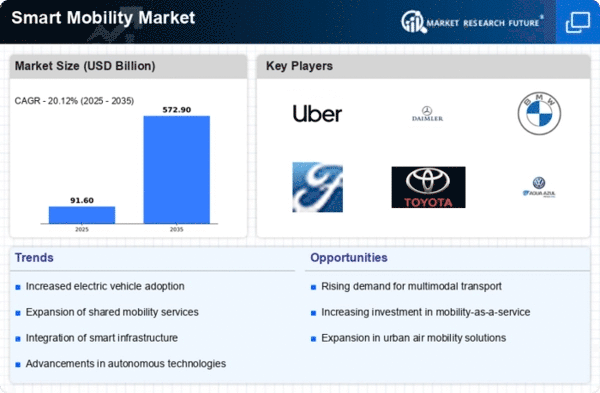Top Industry Leaders in the Smart Mobility Market
 The smart mobility market, characterized by interconnected transportation systems driven by advanced technologies, is currently undergoing explosive growth. This expansion is fueled by the surge in electric vehicles (EVs), advancements in autonomous driving, and the integration of artificial intelligence (AI) and big data. Effectively navigating this dynamic and disruptive landscape necessitates a thorough understanding of the evolving competitive scenario, key player strategies, and emerging trends.
The smart mobility market, characterized by interconnected transportation systems driven by advanced technologies, is currently undergoing explosive growth. This expansion is fueled by the surge in electric vehicles (EVs), advancements in autonomous driving, and the integration of artificial intelligence (AI) and big data. Effectively navigating this dynamic and disruptive landscape necessitates a thorough understanding of the evolving competitive scenario, key player strategies, and emerging trends.
Key Players and Their Strategies:
Prominent companies in the smart mobility market include-
Cisco,
Excelfore Corporation,
Ford Motor Company,
Innoviz Technologies. Inc.,
MAAS Global Oy,
QuaLiX Information System,
Robert Bosch GmbH,
Siemens,
TomTom International,
Toyota Motor Corporation and others.
Traditional Automotive Giants: Established automotive giants like Toyota, Ford, and General Motors are leveraging their manufacturing prowess and brand recognition to heavily invest in EV development and autonomous driving technologies. Toyota, for example, has partnered with Uber to launch robotaxi services, while Ford is focused on expanding its electric car lineup, such as the Mustang Mach-E.
Technology Giants: Companies like Google, Baidu, and Apple are entering the market with their expertise in data analytics, AI, and software development. Google's Waymo project is a frontrunner in autonomous driving, while Baidu's Apollo platform offers an open-source framework for autonomous vehicle development.
Mobility-as-a-Service (MaaS) Providers: Companies like Uber, Lyft, and Bird are pushing the boundaries of urban mobility with on-demand ride-hailing and micro-mobility solutions. Uber is actively testing autonomous vehicles, and Lyft has partnered with Waymo to launch driverless ride-hailing services.
Infrastructure and Technology Solution Providers: Companies like Siemens, Bosch, and Qualcomm focus on developing smart infrastructure solutions, including connected traffic lights and vehicle-to-everything (V2X) communication technologies, crucial for enabling efficient and safe transportation systems.
Factors for Market Share Analysis:
Product and Technology Portfolio: Offering a diverse range of solutions for different segments strengthens market share.
Geographic Reach and Market Penetration: Global presence and successful deployment across regions contribute significantly to market share dominance.
Brand Reputation and Consumer Trust: Building trust and a strong brand image are crucial for attracting and retaining customers.
Partnerships and Collaborations: Strategic alliances with key players accelerate market reach and unlock new opportunities.
Investment in Research and Development (R&D): Continuous investment in R&D fosters market leadership by staying at the forefront of technological advancements.
New and Emerging Trends:
Connected and Autonomous Micro-Mobility Solutions: AI and V2X technology are transforming urban transportation through electric scooters, e-bikes, and other micro-mobility options.
Integration of Blockchain Technology: Blockchain applications, such as secure data sharing and identity management, hold immense potential for the smart mobility ecosystem.
Personalization and Customization of Mobility Experiences: Leveraging user data and preferences for personalized travel options is an emerging trend.
Focus on Sustainability and Environmental Impact: Developing eco-friendly smart mobility solutions, including energy-efficient vehicles and intelligent traffic management systems, is gaining importance.
Overall Competitive Scenario:
The smart mobility market is marked by intense competition and continuous innovation. Established players face disruption from tech giants and startups with agile, data-driven approaches. Collaboration and partnerships are becoming key for success, with alliances forming across traditional industry boundaries. Regulatory frameworks and government policies regarding data privacy, safety standards, and infrastructure development significantly impact the competitive landscape.
Understanding key players, market share factors, emerging trends, and the overall competitive scenario is crucial for success in this rapidly evolving space. By leveraging cutting-edge technologies, fostering partnerships, and prioritizing sustainability, businesses can thrive in this transformative market and shape the future of transportation.
Industry Developments and Latest Updates:
Cisco (December 15, 2023): Cisco announced a partnership with HERE Technologies to deliver comprehensive Connected Vehicle Platform (CVP) solutions, combining networking expertise with location data for smarter and safer transportation systems.
Excelfore Corporation (December 19, 2023): Excelfore released a white paper titled "Unlocking the Power of V2X for Smart Cities," exploring the potential of Vehicle-to-Everything (V2X) technology in improving urban traffic flow, safety, and sustainability.
Ford Motor Company (December 20, 2023): Ford plans to invest $5 billion in a new electric vehicle battery plant in Michigan, a significant step towards becoming a leader in the EV market.
Innoviz Technologies. Inc. (December 18, 2023): Innoviz announced a strategic partnership with Magna International to develop solid-state LiDAR sensors for autonomous vehicles, promising higher performance and lower cost.
MAAS Global Oy (December 14, 2023): MAAS Global successfully completed a pilot project testing its autonomous shuttle technology in Helsinki, Finland, demonstrating the feasibility of using autonomous shuttles for public transportation.
QuaLiX Information System (December 16, 2023): QuaLiX expanded its smart parking solutions to include electric vehicle charging management, allowing parking operators to offer integrated charging services for EV drivers.










